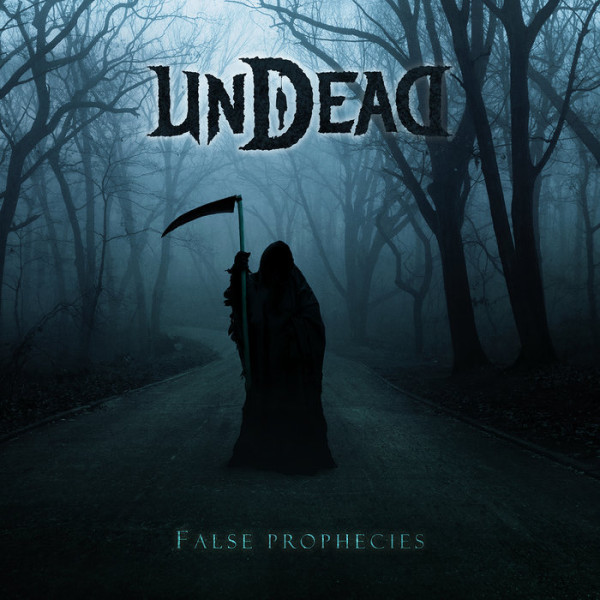Undead plays a well-tried formula of simple, middle-paced death metal while achieving effective songwriting. At times we can hear a tinge of Scandinavian sound, while some other parts scream out early and straight up U.S. death metal like Obituary or Death in Spiritual Healing. This isn’t as complex, structure-wise, as Cause of Death (which isn’t very complex to begin with either), and so approaches Schuldiner’s ultra simplistic death metal much more. Having mentioned both bands, fans of James Murphy’s work in them will not be disappointed with the soloing in False Prophecies.
This album shows the perfect balance between variety of content and consistency in style with clarity of voice. Songs do not sound like they are based on a template (even if they are, the important thing is that they do not appear like they are, that is the final product), but you can easily recognize them as belonging together. As in any album with good songwriting, the mood and character of riffs from one section of the song flows and dives into the next, carrying the listener forward without the obstacle of forced expressions. This style is heavily based on introducing appropriate variations in riff character without deviating from the mood at all.
The weaknesses of this album may lie in individual riffs, which in the end does more merit to the songwriting abilities of these gentlemen. This is to say, if you make a boring riff, sound appropriate, useful, and driving because of its context, then you have succeeded in your task as a composer. Still, this minor complaint will be on the minds of metalheads as it is the nature of the genre to look forward to strong riffs, the muscles of metal, even more important in the straight forward style of Undead.
Tags: 2015, death metal, False Prophecies, Undead



“Songs do not sound like they are based on a template (even if they are, the important thing is that they do not appear like they are, that is the final product)”
This is an important point phrased awkwardly. What you mean to say is that bands can begin with generic or formulaic blueprints and develop something that expresses their unique vision, right? Even if many bands begin at the same point (be it composition styles, structuring methods, playing technique, instrumentation), the good ones will end up where no one else could.
Yes!
Take the Sonata Form (actually this was discovered and dubbed so after the fact, I understand), for instance.
Mozart created masterworks, original, beautiful pieces and works, modelled after tried “formulas” of the past.
So did others like Bach, but they appropriated them. And Bach and Beethoven especially took them, then destroyed them, and molded them to their own purposes. But first, they used them and learned them, crawling under many of their works is usually some kind of template.
Beethoven did actively tried to escape this, though.
I thought so, I could have taken that sentence in a different way but wanted to make sure it was clear.
I’ve seen comments in the past talking about how boring some speed metal or heavy metal is because of the formulaic structures that make up the song (Manilla Road comes to mind). But I’ve never seen the reasoning behind the claim that verse-chorus structuring is inherently inferior or not appropriate for metal bands. Probably a false conclusion based on the sad reality that a lot of “extreme” bands are lazy writers and use that formula to structure their otherwise meandering and pointless songs.
u right y’know, there be lots of great stuff which uses such a formula, and tbh Id rather listen to simple lazy shit with power and soul than pretentiouz wank festing any day of the muthafukin week
I actually agree with this analysis. I’ve listened to the track several times. Each time I become less and less interested. It becomes tiresome and forgettable.
Listen to the whole album, wait for it.
And my opinion is that it is a good album, which already better than the vast majority.
But it definitely isn’t something I will remember in a few months.